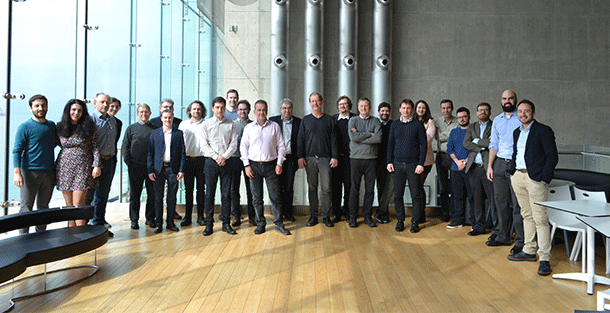Following the submission of a research proposal, the Department of Electrical and Computer Engineering of the Aristotle University of Thessaloniki undertook the coordination of the EASY-RES (Enable Ancillary Services by Renewable Energy Sources) research project, under the Horizon 2020 Competitive Program of the European Union (Reference Call: LCE-07-2017, Research an Innovation Actions). The project is financed entirely by the European Union.
The aim of the research project is to develop novel control algorithms for all converter-interfaced Distributed Renewable Energy Sources (DRES), in order to enable them operate similarly to conventional Synchronous Generators (SG) and provide new Ancillary Services (AS) to the distribution and transmission grid, such as virtual inertia, damping of transients, reactive power exchange for voltage regulation purposes, fault-ride-through and fault-clearing capabilities, and adaptable response to primary frequency control. These new functionalities will be transparent to all grid voltage levels.
In particular, these new methodologies, will contribute to the improvement of EU energy security by allowing very high penetration (up to 100%) of Renewable Energy Sources (RES) in the grid, with simultaneous decommission of large Synchronous Generators (SG) driven by conventional fuels. The high RES penetration will be achieved by making their variable generation more predictable and grid friendly.
EASY-RES will provide the “small" RES owners with the opportunity to actively participate in the future smart grids, since they will be able to offer ancillary services through their RES and be financially compensated in addition to the injected energy. Finally, EASY-RES will create a new electricity market at the distribution network with new roles for both system operators and the small consumers / producers.
The EASY-RES approach is based on the segmentation of the distribution network into small Individual Control Areas (ICAs), where the DRES and properly sized energy storage systems (ESS) will be optimally coordinated via suitably designed ICT infrastructure to provide the aforementioned AS in a bottom-up approach: prosumers and independent RES producers will provide AS to DSOs and the aggregation of these AS will be provided by the DSOs to TSOs. By evaluating the costs and benefits of the developed functionalities, viable business models will be developed for the aforementioned stakeholders.
The project also includes ten more partners: the University of Sevilla (Universidad de Sevilla-Spain), Delft Technical University (Technische Universiteit DELFT-The Netherlands), the University of Passau (Universität Passau, Germany), the University Lancaster University (UK), Zentrum Digitalisierung.Bayern (Germany), the Independent Power Transmission Operator of Greece (ADMIE), the battery manufacturer FENECON GmbH & Co. KG. KG (Germany) and three distribution system operators: Elektro Gorenjska (Slovenia), Stadtwerk Haßfurt GmbH (Germany) and Stadtwerke Landau a.d. Isar (Germany), which have more than 70% of RES in their distribution networks.
The research project started on 1/3/2018 and its duration is 40 months. Its total budget amounts to 4.562.000 Euro.
The kick-off meeting of the partners took place on March 5-8, 2018, in the M2 building of the Thessaloniki Concert Hall.

